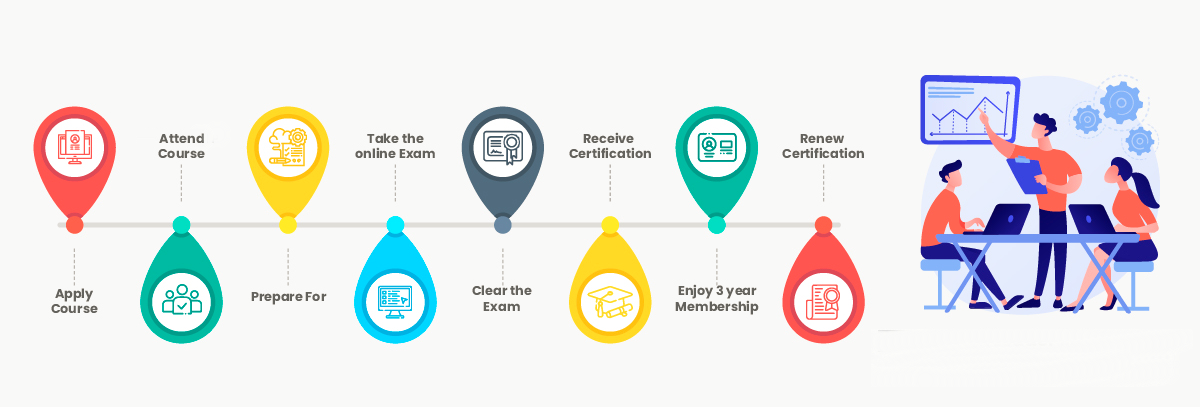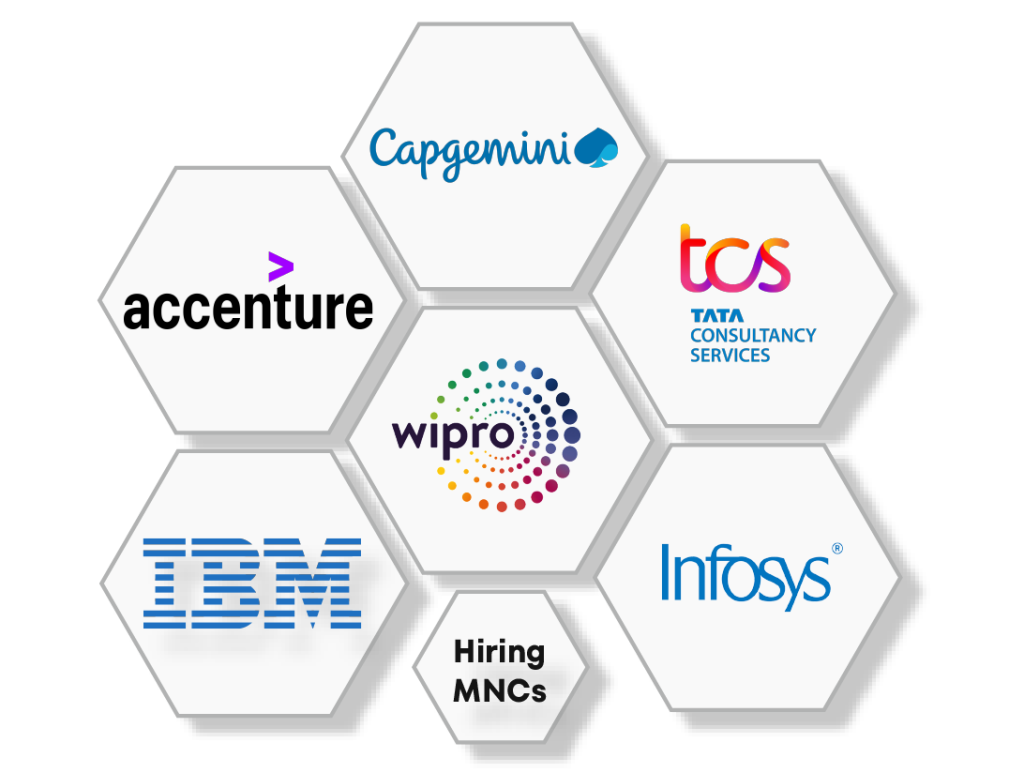
The Education Nest certificate course for J2EE will teach you how to use J2EE for development. Develop your skills as a J2EE developer by gaining a comprehensive understanding of all the essential concepts of J2EE. This training program provides a practical learning experience with real-world illustrations that will allow you to build web applications using J2EE effectively. The course commences with an overview of web basics, establishing a solid foundation for comprehending the functioning of the internet. Then, the course emphasizes understanding the Servlet hierarchy and its management of request/response cycles. Furthermore, the course covers transfer control mechanisms such as forward and redirect. These proficiencies will help you advance in your profession as a J2EE developer. You will gain expertise in this area after completing the course.
Application Deadline: Jun 30, 2023
Upskill for Your Dream Job
Sambodhi, in partnership with Education Nest, offers a comprehensive J2EE training course that includes live project-based training. Our course is designed to teach you the fundamentals of Java 2 Enterprise Edition (J2EE) from 10+ years of experienced industry experts. You will learn how to build robust, scalable, and secure enterprise applications using J2EE technologies like Servlets, JSP, Struts, Spring, and Hibernate. Our live project-based training will help you gain practical experience working with real-world scenarios. Join our J2EE training course to accelerate your career in the Java Enterprise domain.



Instructor-led J2EE live online Training Schedule
May 15th – Weekend
July 1st – Weekend
Why enroll for J2EE Certificate Training Course?

The BLS predicts 22% growth in employment of software developers, including J2EE developers, due to increased technology use across industries.

J2EE developers are in high demand due to the growing need for enterprise-level software. Top MNCs such as IBM, Accenture, Infosys, TCS, Wipro, and Capgemini require skilled J2EE developers.

A J2EE developer in the US can earn an average of $86K p.a, which can vary based on location, experience, and skill. Salaries may grow 5-10% annually based on performance and financial situation.

J2EE Training Course Benefits
J2EE (Java 2 Platform, Enterprise Edition) is a popular platform for developing enterprise-level applications. Education Nest J2EE training course can help individuals improve their Java programming skills and gain expertise in building enterprise-level applications. J2EE is a popular platform used by many organizations, and a J2EE certification can help individuals advance their career prospects by making them more marketable in the job market. J2EE training can help organizations increase the productivity of their developers by equipping them with the necessary skills to build efficient and scalable enterprise-level applications.

Annual Salary

Hiring Companies
Want to become a Java Programming
Professional?
Why J2EE Certificate Training Course from Education Nest






J2EE Core Java Skills Covered
J2EE Training Course Syllabus
J2EE Training Projects

J2EE has been widely used in the retail industry to develop robust and scalable applications that streamline operations and improve customer experiences. Some examples of J2EE projects in retail include e-commerce platforms, supply chain management systems, and inventory management systems. E-commerce platforms allow retailers to sell products online, process payments securely, and manage customer orders. Supply chain management systems provide real-time data on inventory levels, delivery schedules, and supplier performance, allowing retailers to optimize their supply chain and reduce costs. Inventory management systems track stock levels, monitor sales trends, and generate purchase orders to ensure that retailers have the right products in stock at the right time. J2EE has been instrumental in helping retailers transform their business operations and stay competitive in today's digital marketplace.

J2EE is a popular technology in the IT industry that offers many opportunities for developing innovative projects. Some examples of J2EE projects in the IT industry include enterprise resource planning (ERP) systems, customer relationship management (CRM) systems, e-commerce platforms, financial systems, and human resource management systems (HRMS). J2EE is also commonly used in developing web-based applications, mobile applications, and cloud-based solutions. These projects can be implemented in various domains, such as healthcare, finance, retail, transportation, and logistics. J2EE projects require skilled developers with knowledge of J2EE technologies like Servlets, JSP, Struts, Spring, and Hibernate, as well as experience in working with databases, web servers, and application servers.
J2EE Training Description
J2EE is a popular technology used to develop enterprise-level applications in the IT industry. Our J2EE course provides a comprehensive understanding of J2EE technologies like Servlets, JSP, Struts, Spring, and Hibernate, and covers key topics such as architecture, design patterns, and best practices. Our experienced instructors provide hands-on training with real-world projects, enabling students to develop practical skills and gain industry-relevant experience. The course is designed for beginners as well as experienced professionals looking to upskill in J2EE. By the end of the course, students will be able to develop scalable and secure enterprise applications using J2EE technologies, and be equipped to take on challenging roles in the industry.
Here are some objectives of the J2EE course:
Here are some reasons to learn J2EE:
Here are some professionals who can benefit from a J2EE course:
Here are the prerequisites for this J2EE course:
Note that while prior experience in Java development is helpful, it is not a requirement for this course. Beginners can also benefit from this course by building a strong foundation in Java web development and J2EE technologies.
Some of the other popular software and frameworks for Java development are:
Spring Framework: Spring is a popular Java framework used for building scalable and high-performance web applications. It provides a range of features such as dependency injection, data access, and web services.
Apache Struts: Apache Struts is an open-source framework used for building web applications in Java. It follows the Model-View-Controller (MVC) architecture and provides features such as validation, localization, and data access.
JavaServer Faces (JSF): JSF is a popular framework used for building user interfaces for web applications in Java. It provides a range of user interface components and allows for easy integration with other Java technologies.
Apache Maven: Maven is a build automation tool used for building and managing Java projects. It provides features such as dependency management, project reporting, and automated builds.
JavaScript: JavaScript is a popular programming language used for building dynamic and interactive web applications. It can be used in combination with Java for building full-stack web applications.
J2EE is a popular technology used to develop enterprise-level applications in the IT industry. Our J2EE course provides a comprehensive understanding of J2EE technologies like Servlets, JSP, Struts, Spring, and Hibernate, and covers key topics such as architecture, design patterns, and best practices. Our experienced instructors provide hands-on training with real-world projects, enabling students to develop practical skills and gain industry-relevant experience. The course is designed for beginners as well as experienced professionals looking to upskill in J2EE. By the end of the course, students will be able to develop scalable and secure enterprise applications using J2EE technologies, and be equipped to take on challenging roles in the industry.
Here are some objectives of the J2EE course:
Here are some reasons to learn J2EE:
Here are some professionals who can benefit from a J2EE course:
Here are the prerequisites for this J2EE course:
Note that while prior experience in Java development is helpful, it is not a requirement for this course. Beginners can also benefit from this course by building a strong foundation in Java web development and J2EE technologies.
Some of the other popular software and frameworks for Java development are:
Spring Framework: Spring is a popular Java framework used for building scalable and high-performance web applications. It provides a range of features such as dependency injection, data access, and web services.
Apache Struts: Apache Struts is an open-source framework used for building web applications in Java. It follows the Model-View-Controller (MVC) architecture and provides features such as validation, localization, and data access.
JavaServer Faces (JSF): JSF is a popular framework used for building user interfaces for web applications in Java. It provides a range of user interface components and allows for easy integration with other Java technologies.
Apache Maven: Maven is a build automation tool used for building and managing Java projects. It provides features such as dependency management, project reporting, and automated builds.
JavaScript: JavaScript is a popular programming language used for building dynamic and interactive web applications. It can be used in combination with Java for building full-stack web applications.
J2EE Certificate Training Course reviews
Read learner testimonials
Natalie Torres
After finishing the J2EE training, I wanted to learn more, so I enrolled in an advanced course that taught me more about Java. We worked on a project that felt like a real-world experience. Thank you to Education Nest for providing such a great opportunity!
Swati
Sambodhi and Education Nest's J2EE course was exceptional. The trainers are highly experienced and provided live project-based training. Education Nest offers the best software training I have experienced in my career.
Pradeep Sharma
Highly recommended! Sambodhi and Education Nest provide excellent J2EE training with hands-on experience and continuous teacher support. Quality is maintained throughout the course, and the staff is very cooperative.
Hear from our learners
Lorem ipsum dolor sit amet, consectetur adipiscing elit. Ut elit tellus, luctus nec ullamcorper mattis, pulvinar dapibus leo.
Lorem ipsum dolor sit amet, consectetur adipiscing elit. Ut elit tellus, luctus nec ullamcorper mattis, pulvinar dapibus leo.
Lorem ipsum dolor sit amet, consectetur adipiscing elit. Ut elit tellus, luctus nec ullamcorper mattis, pulvinar dapibus leo.
Like what you hear from our learners?
Creating Epic Presentations: Communicating Powerful Ideas reviews
J2EE Training FAQs
If you miss an online J2EE Training class, it’s important to reach out to the instructor or the support team of the online training platform you are using. They may be able to provide you with a recording or transcript of the missed class, so that you can catch up on what you missed. Alternatively, some platforms offer on-demand access to class materials, so you can go back and review the content on your own time. It’s always a good idea to try and make up the missed material as soon as possible, so that you don’t fall behind in your learning.
If you have queries after completing an online J2EE Training course, Education Nest training platforms offer some form of post-course support. This may include access to a dedicated support team, a community forum where you can ask questions and connect with other learners, or even one-on-one sessions with an instructor or coach. If you have specific questions or concerns related to the course material, you can reach out to the instructor directly or use the support channels provided by the platform. It’s always a good idea to clarify any doubts or questions you may have, as this will help to solidify your understanding of the material and ensure that you can apply what you’ve learned in a real-world context.
J2EE (Java 2 Platform, Enterprise Edition) is a powerful platform for developing distributed, multi-tier, scalable, and secure enterprise applications. It is a collection of Java-based APIs, technologies, and frameworks that simplify the development and deployment of large-scale, mission-critical applications. J2EE provides a set of standard components, such as servlets, JavaServer Pages (JSPs), Enterprise JavaBeans (EJBs), and Java Message Service (JMS), that can be used to build robust and scalable applications. J2EE is widely used in various industries, including finance, healthcare, and e-commerce, to develop large-scale and complex applications that can handle high volumes of data and transactions.
The timing of when you get access to learning content after signing up for an online J2EE Training course will depend on the specific training platform you are using. In most cases, you should receive access to the learning content immediately upon signing up, or shortly after your payment has been processed. Some platforms may require you to complete an enrolment process or set up an account before you can access the content. It’s always a good idea to check the specific details of the course or platform you are using, as the timing and process may vary. If you are experiencing any issues accessing the learning content, you should contact the support team of the training platform for assistance.
Once you enrol in J2EE Training course, you will typically have access to the course material for as long as the course remains available on the platform. This means that you can revisit the material at any time, even after you have completed the course, and continue to learn and improve your skills. The benefit of lifetime access to the learning material is that it allows you to learn at your own pace and on your own schedule. You can review the content as many times as you need to fully understand the concepts and techniques covered in the course. Additionally, if you encounter a new challenge in your work or personal life, you can go back to the course material to find solutions and strategies to help you overcome the challenge. Having access to course material for a lifetime is a valuable benefit, as it allows you to continue to improve your skills and knowledge long after you have completed the course. So, if you are interested in improving your Java skills and want the flexibility to learn at your own pace, consider enrolling in a J2EE Training course that offers lifetime access to the learning material.
If you miss an online J2EE Training class, it’s important to reach out to the instructor or the support team of the online training platform you are using. They may be able to provide you with a recording or transcript of the missed class, so that you can catch up on what you missed. Alternatively, some platforms offer on-demand access to class materials, so you can go back and review the content on your own time. It’s always a good idea to try and make up the missed material as soon as possible, so that you don’t fall behind in your learning.
If you have queries after completing an online J2EE Training course, Education Nest training platforms offer some form of post-course support. This may include access to a dedicated support team, a community forum where you can ask questions and connect with other learners, or even one-on-one sessions with an instructor or coach. If you have specific questions or concerns related to the course material, you can reach out to the instructor directly or use the support channels provided by the platform. It’s always a good idea to clarify any doubts or questions you may have, as this will help to solidify your understanding of the material and ensure that you can apply what you’ve learned in a real-world context.
J2EE (Java 2 Platform, Enterprise Edition) is a powerful platform for developing distributed, multi-tier, scalable, and secure enterprise applications. It is a collection of Java-based APIs, technologies, and frameworks that simplify the development and deployment of large-scale, mission-critical applications. J2EE provides a set of standard components, such as servlets, JavaServer Pages (JSPs), Enterprise JavaBeans (EJBs), and Java Message Service (JMS), that can be used to build robust and scalable applications. J2EE is widely used in various industries, including finance, healthcare, and e-commerce, to develop large-scale and complex applications that can handle high volumes of data and transactions.
The timing of when you get access to learning content after signing up for an online J2EE Training course will depend on the specific training platform you are using. In most cases, you should receive access to the learning content immediately upon signing up, or shortly after your payment has been processed. Some platforms may require you to complete an enrolment process or set up an account before you can access the content. It’s always a good idea to check the specific details of the course or platform you are using, as the timing and process may vary. If you are experiencing any issues accessing the learning content, you should contact the support team of the training platform for assistance.
Once you enrol in J2EE Training course, you will typically have access to the course material for as long as the course remains available on the platform. This means that you can revisit the material at any time, even after you have completed the course, and continue to learn and improve your skills. The benefit of lifetime access to the learning material is that it allows you to learn at your own pace and on your own schedule. You can review the content as many times as you need to fully understand the concepts and techniques covered in the course. Additionally, if you encounter a new challenge in your work or personal life, you can go back to the course material to find solutions and strategies to help you overcome the challenge. Having access to course material for a lifetime is a valuable benefit, as it allows you to continue to improve your skills and knowledge long after you have completed the course. So, if you are interested in improving your Java skills and want the flexibility to learn at your own pace, consider enrolling in a J2EE Training course that offers lifetime access to the learning material.
Be future ready, start learning